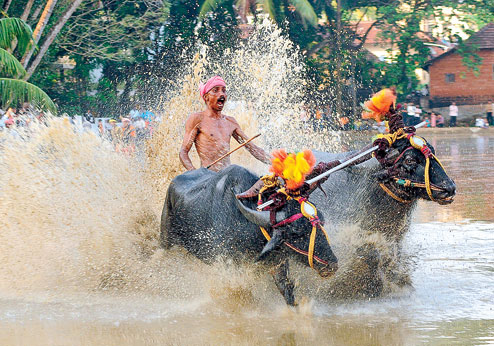
Bangalore, Jan. 23: After the snort of the bull-tamers in Tamil Nadu comes the thunder of the buffalo hooves in neighbouring Karnataka.
Supporters of kambala, a buffalo race run on slush tracks in southern Karnataka, are girding up for a mass agitation to get back the race they insist is at the heart of local folklore and culture.
Unlike jallikattu where the participants try to tame bulls, the kambala buffaloes race in knee-deep water ahead of their jockeys on slush tracks of 100 to 150 metres laid on farmland.
Both forms of "sport" have a common thread - kambala has been stayed by Karnataka High Court in November on a petition filed by the same organisation that had campaigned against jallikattu: Peta or People for the Ethical Treatment of Animals. Peta went to court against kambala on the ground of cruelty to animals.
Another bovine bond: the movers and shakers of each state have lined up behind the fans of the sports.
Karnataka chief minister P.C. Siddaramaiah said: "The state government backs kambala and I request the central government to do (for the buffalo race) what they did to facilitate jallikattu (clearing the Tamil Nadu ordinance)."
State BJP president B.S. Yeddyurappa voiced support: "This (kambala) has longstanding history in our culture. I see no reason why it should be stopped altogether."
Like the Tamil stars' support for jallikattu, Kannada superstar Shiva Rajkumar has batted for kambala. "Both kambala and jallikattu must be preserved as they are traditional sports of our rural people," Shiva said.
Inspired by the events in Tamil Nadu, the Dakshina Kannada Udupi Kambala Samithi has decided to move the high court tomorrow seeking to have the stay on the race lifted.
After that stay in November, the Congress government in the state had set up a committee to examine claims of cruelty during the race. But the stay also meant that there were no races for the panel to study.
"Only if we can hold our races can the committee study the event," Samithi president Barkuru Shantaram told The Telegraph today. The case is scheduled to come up on January 30 but the Samithi wants the hearing advanced.
More than a hundred races are held during the harvest season between December and March in the Dakshina Kannada and Udupi districts, besides Kasaragod in the neighbouring Kerala. "This festival transcends religion as there are Christians, Muslims and Jains among the buffalo owners," Shetty said.
"We see fatal injuries in cricket and football but I've never known anyone dying in a kambala race. As spectators are kept away from the track, there is no chance of injuries of the kind one sees in jallikattu," said Shetty.
Some organisers have planned a protest in Moodabidri, 30km from Mangalore, on January 28. "We expect about 75,000 people and 200 pairs of kambala buffaloes to assemble before racing at a track nearby," said Ashok Rai, president of the Mangalore Kambala Committee.
Rai denied Peta's allegations about cruelty and claimed that kambala buffaloes were never beaten or abused. "These buffaloes are part of our culture and, therefore, treated with great respect. They are provided pools to cool their bodies, special diet and oil massages and even AC rooms to sleep in during the scorching south Karnataka heat," Rai said.
"Recorded history shows kambala has been an integral part of our folk culture and religious rituals for over 600 years. That's why I don't understand why an American NGO like Peta should come and spoil our lives?" asked Rai.
Peta couldn't be reached for comment despite several attempts.
Gunapala Kadamba, chairman of the Kambala Preservation, Management and Training Academy, a non-profit institution, said kambala's critics had not seen the events themselves. "I invite Peta to visit us and see how we keep the sport free of any kind of animal cruelty."
His four-year-old institution offers free 10-day training for kambala jockeys. "We hold classes on yoga, physiotherapy and nutritional aspects for the jockeys and the racing buffaloes," said Kadamba.
A few years ago, Kadamba had introduced "photo finish" and other monitoring devices to ensure fair races. "We are trying to make this ancient game more interesting with modern gadgets," added the man credited with changing the face of buffalo racing.










